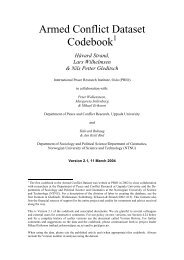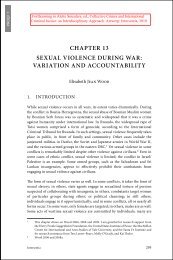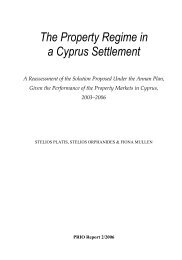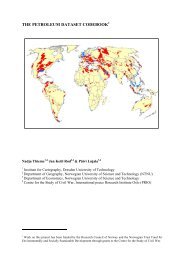Towards a Property Settlement in Cyprus - PRIO
Towards a Property Settlement in Cyprus - PRIO
Towards a Property Settlement in Cyprus - PRIO
You also want an ePaper? Increase the reach of your titles
YUMPU automatically turns print PDFs into web optimized ePapers that Google loves.
Summary<br />
5<br />
cont<strong>in</strong>ued to explore the means of compensation <strong>in</strong> the event of a settlement. potentially the<br />
sides could converge on a formula that l<strong>in</strong>ks compensation to the value of property at the<br />
po<strong>in</strong>t of sale. the Greek cypriot side envisions public debt issued by the property commission<br />
while imply<strong>in</strong>g that current users also contribute. compensation payments would be l<strong>in</strong>ked<br />
to the value of property over time. the turkish cypriot side elaborated a ‘Guaranteed f<strong>in</strong>ancial<br />
entitlement’ (Gfe) that would be payable and guaranteed by the turkish cypriot constituent<br />
state. through the government it would be possible to collect funds to pay the Gfes from<br />
current users who ga<strong>in</strong> title entail<strong>in</strong>g a hybrid form of property and capital ga<strong>in</strong>s tax, where<br />
tax is l<strong>in</strong>ked to value. on the matter of exchange, less convergence is evident. the turkish<br />
side put forward a unique, but somewhat controversial proposal, to establish a property<br />
Development corporation (pDc). the pDc would develop ‘adversely affected property’. the<br />
model is based on the practice of ‘urban transformation’ (i.e., grand improve ment plans)<br />
implemented <strong>in</strong> a variety of countries. the turkish cypriots say this is to ensure fair basis for<br />
exchange, s<strong>in</strong>ce many turkish cypriot properties that rema<strong>in</strong> are relatively low <strong>in</strong> value. the<br />
turkish cypriot side contends that urban transformation would serve to release ‘trapped<br />
value’. the turkish cypriot side contends that many of the affected properties are ‘structurally<br />
depressed’, s<strong>in</strong>ce the values (of the turkish cypriot properties <strong>in</strong> the south) are mostly due to<br />
zon<strong>in</strong>g and the guardian laws that preempted development. By contrast, affected Greek<br />
cypriot properties <strong>in</strong> north are developed (and benefit from newer <strong>in</strong>fra structure). so far, the<br />
Greek cypriot side has not rejected urban transformation outright, s<strong>in</strong>ce it may make<br />
exchange more attractive. the two sides have spent as much energy try<strong>in</strong>g to conv<strong>in</strong>ce the<br />
mediators of the merits of their respective positions as they have strived to conv<strong>in</strong>ce one<br />
another. mediators seem to th<strong>in</strong>k territory and property issues can be l<strong>in</strong>ked; someth<strong>in</strong>g the<br />
Greek cypriot side has recommended. it is assumed that Greek cypriots might accept less<br />
property re<strong>in</strong>statement (<strong>in</strong> the turkish cypriot constituent state) <strong>in</strong> return for more territory.<br />
the Greek cypriot side asks for 100,000 (out of 162,000 displaced persons) to be allowed to<br />
return as a result of territorial adjustment. these figures imply <strong>in</strong>direct nego tiations regard<strong>in</strong>g<br />
the Karpass/Karpaz pen<strong>in</strong>sula. However, as of the conference, the sides had not discussed<br />
numbers or maps (supposedly to be left to the f<strong>in</strong>al ‘give and take’ stage of the formal round<br />
of negotiations). Kaymak concluded by reflect<strong>in</strong>g on the potential for reconcil<strong>in</strong>g the two<br />
positions. He noted that some experts and mediators suggest a model of ‘hierarchy’ whereby<br />
owners and current users, as opposed to properties, are categorized (which is the logic of the<br />
ecHr actually; determ<strong>in</strong><strong>in</strong>g how to resolve compet<strong>in</strong>g <strong>in</strong>terests). thus, it is assumed that<br />
liv<strong>in</strong>g displaced persons might be high <strong>in</strong> the hierarchy (thus among those to exercise first<br />
right of refusal). similar rank<strong>in</strong>g categories could be made among current users and com -<br />
pet<strong>in</strong>g rights assessed <strong>in</strong> a matrix. ultimately any agreement would require approval <strong>in</strong><br />
referenda, so the particular model must satisfy the majority and be deemed equitable.

















